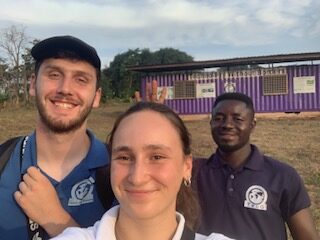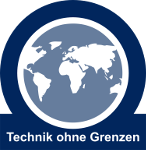Erweiterung des TCB-Projekts in Ghana – IT Ausstattung und Maintenance
About the Project

Project Idea and Goals
The TCB working group of the Erlangen regional chapter continued its efforts in Ghana to improve sustainable access to IT education. Following the successful project in Sunyani in 2024, this year’s goal was to equip another school with laptops, train teachers, and evaluate previous projects in Agona Abodom. Additionally, we aimed to strengthen the local TeoG group and enable them to carry out projects independently in the future.Arrival and First Encounters
Our arrival in Accra was warm and welcoming: Beatrice and her sisters greeted us with open arms before we traveled on to Agona Abodom. There, we finally met Derrick in person—a special moment after so many online meetings. During a gathering with teachers and principals from previous projects, we received valuable feedback and discussed new ideas. Oliver from Erlangen joined digitally and presented his project concept for next year. Beyond the technical discussions, personal exchange was crucial because trust grows through real-life encounters.Journey to Sunyani and Initial Challenges
After a shared dinner and a restful night, we visited the local church and spoke with the community before heading to Sunyani. The trip was challenging: after nine hours and four trotro rides, we only made it as far as Kumasi, where our partner Anthony kindly arranged accommodation. The next morning, we embarked on a “printer hunt” to provide Jed’s hometown (RG Sunyani) with a community printer and purchased extension cables for the soon-to-arrive laptops. Then came the bad news: the shipped devices would not arrive in time. For future projects, we need to weigh slow sea freight with batteries against faster DHL shipping without batteries and the risk of damage.Change of Direction: Focus on KnowledgeBox
At the TeoG container in Sunyani, we decided to take a new approach. Instead of waiting for the laptops, we used the time to conduct a workshop on configuring the KnowledgeBox and created materials for future use. This way, we aimed to empower the Sunyani regional group to work autonomously and respond directly to schools’ needs. During this process, the idea emerged to equip Notre Dame Girls Senior High School with a KnowledgeBox. The school already has a computer lab, but only 10 devices for 50 students. The KnowledgeBox provides offline access to teaching materials and could lay the foundation for a new project—possibly even as a remote initiative. Instead of spending on flights, funds could be invested in high-performance hardware such as a strong router or additional RAM for donated laptops.An Intensive Second Week
The second week was marked by workshops and technical challenges. Since the laptops would arrive only after our departure, installation and setup had to be handled by our partners—a step requiring trust and thorough preparation. We conducted an intensive workshop with local TeoG members, teaching them how to manage the devices and adapt the KnowledgeBox flexibly. The atmosphere was lively, curiosity was high, and after answering the last questions, we celebrated the day’s success with a cold drink. Setting up an additional KnowledgeBox required patience, especially due to extremely slow internet speeds—transferring over 100 GB of data was a real test of endurance.Encounters and Special Moments
Beyond the technical work, the trip offered memorable experiences: we introduced TeoG to the mayor of Sunyani, who showed great interest and even published our meeting officially. A particularly moving moment was an invitation to a remote community, where we witnessed a well being repaired with the simplest tools—a task that in Germany would likely require heavy machinery.Results and Return Journey
By the end of our stay, we were proud to see the KnowledgeBoxes successfully implemented in both schools. Teacher workshops were well attended—at Notre Dame Girls Senior High School, participation was so high that we had to move to the large assembly hall. Just as important as these technical successes were the relationships we built: whether during shared meals, workshops, or evenings at local bars and restaurants, mutual trust deepened everywhere. The return trip posed one last challenge: due to road closures in Kumasi following the death of a tribal queen, we had to improvise and take detours. Eventually, we reached Accra—tired but relieved. We spent our final day enjoying delicious fufu, reconnecting with old friends, and soaking up one last piece of Ghanaian life before heading home after just 14 days.Lessons Learned and Outlook
Our experiences in Ghana made one thing clear: projects require flexibility, patience, and improvisation. Even more important are the relationships we build—they form the foundation for everything. Technology matters, but trust and collaboration are the keys to lasting impact. Looking ahead, we plan to expand the KnowledgeBox initiative, explore remote project models, and strengthen local structures. Despite all challenges, the project was a success: KnowledgeBoxes were deployed, workshops were well received, and partnerships on the ground grew stronger.Information
Project number
GHA_79
Project Leader
Felicitas Stichlmayr
Regional Groups
- Erlangen
- Sunyani
Project members
Jan Amtmann
Project Category
 Agroforestry
Agroforestry Timespan
February 2026 - now
Project stage
current
News
No entries.
